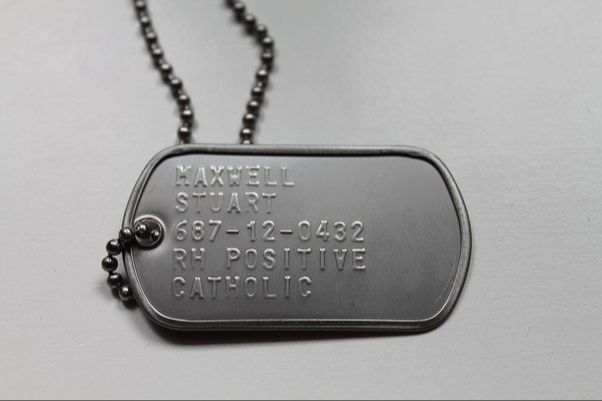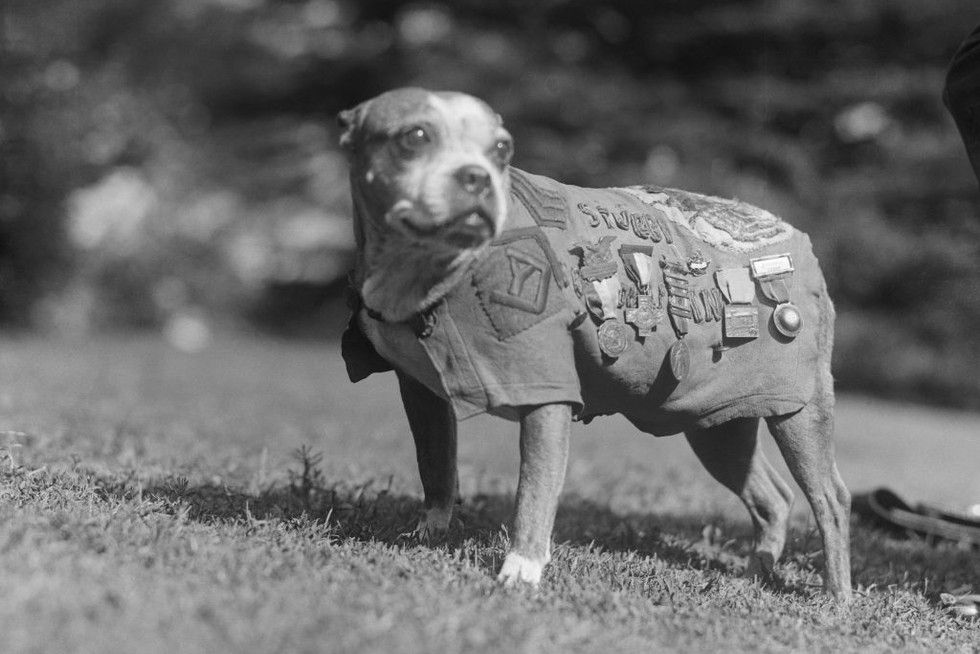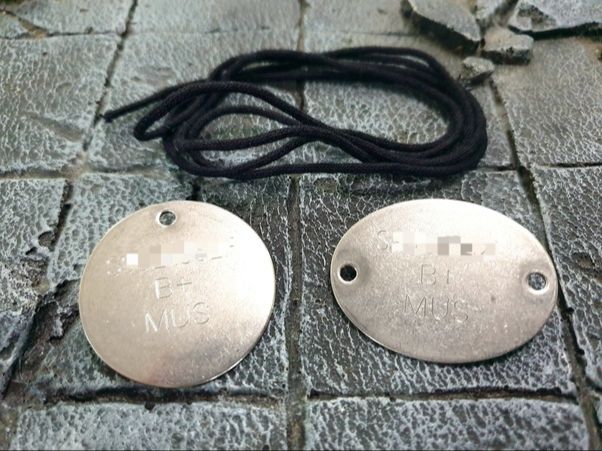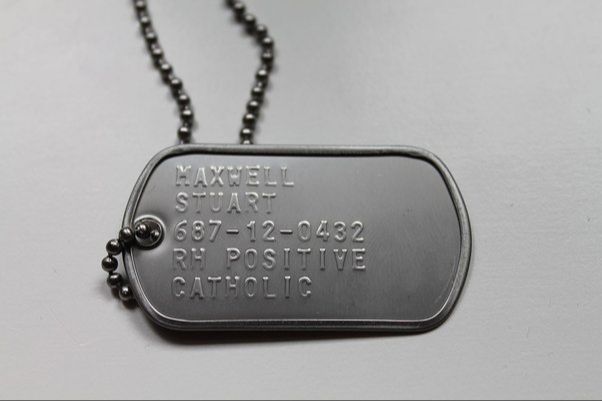Introduction
Military dog tags have been used by soldiers for identification purposes in the event of death or injury in combat since the Civil War. They typically contain basic personal information about the soldier. Taking an enemy’s dog tags as a war trophy raises complex ethical and legal issues. While historically common, the practice is now controversial and discouraged by many militaries.
This article will provide an overview of the history and purpose of military dog tags, examine the laws and regulations surrounding the practice of taking enemy dog tags, discuss practical and ethical considerations, and explore military policies on this complex issue. Perspectives from soldiers and cultural attitudes will also be considered. The goal is to comprehensively analyze the debate around soldiers collecting opponent’s dog tags in war.
Purpose of Dog Tags
The purpose of dog tags is to identify fallen soldiers and provide medical information. As described on Custom Military Dog Tags, military dog tags are worn by armed forces members worldwide and serve as critical identification in case a service member is injured or killed in action. The key details engraved on dog tags, such as name, rank, service branch, blood type, and religious affiliation, allow the military to identify soldiers and access their service records. This enables proper notification of next of kin and facilitates providing the appropriate medical treatment in emergencies, as explained on Military Dog Tags: The Ultimate Guide. Having two identical dog tags allows one to remain with the soldier while the other can be collected for identification purposes. Overall, dog tags play a vital role in battlefield situations by ensuring fallen or injured soldiers can be promptly and accurately identified.
Laws and Regulations
The Geneva Conventions, which most countries have signed, contain rules about how militaries must treat enemy wounded and dead. According to the International Committee of the Red Cross (ICRC), under the Geneva Conventions it is prohibited to despoil or mutilate dead bodies. This is considered an affront to human dignity and a violation of international humanitarian law.
Specifically, Article 17 of the First Geneva Convention states that parties must “ensure that the dead are honourably interred, if possible according to the rites of the religion to which they belonged.” Rule 116 also prohibits mutilating dead bodies.
For the U.S. military, the Code of Conduct provides guidance on treating enemy dead. It states that U.S. soldiers must respect and properly care for enemy wounded, sick, and dead. This includes properly disposing of enemy remains and any personal effects.
Therefore, laws and military codes prohibit taking items off dead enemy soldiers purely as trophies of war. Proper burial and respect for the dead is considered vitally important under international humanitarian law.
Practical Considerations
Some soldiers have taken enemy dog tags for various practical reasons. One key reason is the potential intelligence value of the tags [1]. Dog tags contain personal information about the enemy soldier that could aid military intelligence gathering and analysis. Soldiers who served as translators and interpreters during WWII recognized the importance of collecting enemy documents and identification [2].

Another practical reason is to keep as proof of the soldier’s actions and achievements in combat. Some soldiers have taken dog tags as souvenirs or trophies from the battlefield. Having an enemy’s dog tags can serve as a tangible reminder of their participation in combat.
Finally, some soldiers have taken dog tags to return any personal effects to the enemy’s family. While this occurs less frequently, some soldiers have viewed returning dog tags as providing closure or honoring a fallen opponent [3].
Ethical Perspectives
There are various ethical issues to consider regarding taking enemy dog tags in war. Some argue it shows disrespect for the dead and dehumanizes enemies. Others view collecting dog tags as trophy hunting or celebrating kills, which they deem unethical.
According to some experts, taking dog tags off dead soldiers violates principles of respecting the deceased (https://www.quora.com/Is-it-a-war-crime-to-collect-enemy-dog-tags). Removing personal effects from the dead could be seen as undignified and infringing on their humanity. This perspective emphasizes maintaining ethical standards even during warfare.
Additionally, some view collecting enemy dog tags as glorifying violence or turning death into a game. They argue it promotes the unethical mentality of tallying up “kills” and dehumanizing opponents as mere targets. This trophy hunting mindset is seen as detrimental to moral principles.
However, others argue pragmatic or lawful considerations may override these ethical concerns in the realities of war. The debate continues on balancing ethics and military objectives when it comes to battlefield conduct regarding enemy remains.
Accounts from Soldiers
Many soldiers have shared their perspectives on taking enemy dog tags in combat situations. Some see it as a way to confirm kills and gather intelligence, while others view it as disrespectful or unethical. According to an account on Quora, some soldiers take dog tags or other identifying items from enemies to record confirmed kills and as proof of their combat experience [1]. However, views vary based on personal ethics and military culture.
In a post on Reddit, one soldier explained, “I never took any [dog tags] off dead enemies. I guess some guys did for trophies but I didn’t want some dude’s dirty *** dog tags.” Others mentioned only taking them if ordered to do so for intelligence purposes. Some expressed regret over taking dog tags earlier in their careers before realizing it was wrong.
First-hand accounts reveal a range of perspectives on the issue within military ranks. While some view taking enemy dog tags as a way to document actions in combat, others see it as disrespectful or unethical. Proper handling of the deceased remains a concern as well. Overall, soldiers’ views seem heavily influenced by personal values and military norms.
Military Policy
Though soldiers in battle may be tempted to take enemy dog tags as trophies of war, official military policy often prohibits this practice. According to the U.S. Army’s Law of War Manual, “The respectful treatment of the dead is one of the oldest rules in the law of war.”1 Enemy dead must be protected against disrespectful treatment, and their personal effects should be collected and returned to proper authorities. As such, U.S. soldiers are not permitted to retain enemy dog tags or other personal items for souvenirs.
The U.K. Ministry of Defence’s Law of Armed Conflict manual states, “The dead must be protected against pillage and mutilation. The property of the deceased should be collected together and forwarded to the appropriate agency so that it can be processed according to applicable national procedures.”2 Thus British forces are expected to turn over any collected enemy dog tags to authorities as well.
While policies may differ between militaries, most modern professional armed forces prohibit soldiers from keeping enemy dog tags or personal effects. Though individuals may be tempted, military regulations generally require respectful handling of the deceased and returning items like dog tags to proper authorities.
Cultural Significance
Dog tags have held deep symbolic meaning for soldiers across many cultures and eras of warfare. Soldiers have long engaged in the practice of taking war trophies from fallen enemies, with the Wikipedia article on war trophies noting that common trophies include “flags, weapons, vehicles, and art.” In the context of the Civil War, historian J.E. Cashin describes how some Union soldiers took war trophies from Confederate soldiers, though others like General William Sherman refused to do so.

For many soldiers throughout history, possessing an enemy’s dog tag has represented claiming victory over them in battle. The dog tag symbolizes the enemy soldier’s identity and mortality, serving as a memento of having survived while they did not. This practice evokes complex emotions, often relating to grief, trauma, guilt, and the mental burdens of war. While some soldiers choose not to take trophies as it feels dishonorable, others find meaning in retaining an artifact representing someone they killed in combat.
Alternatives to Taking Dog Tags
While some soldiers take enemy dog tags as trophies of war, many military officials and ethics scholars recommend alternative approaches that are more respectful. Rather than physically taking an enemy’s dog tags off the body, soldiers have several other options:
One alternative is to photograph or carefully document the enemy’s name and other identifying information on the dog tags, without removing them from the body. This allows the soldier to have a record to confirm the identity of enemy combatants for reporting purposes, but does not disrespectfully strip away an item of personal importance. As one Reddit user commented, “Taking photos of dog tags would prevent revives just the same in gaming, and avoids glorifying war trophies in real life.”

Another option is to leave the dog tags on the body, but report their identity through proper channels to military officials. The Geneva Conventions require respectful treatment of the dead, so removing personal effects could be seen as unethical. Soldiers can record key information to report identities without taking possession of the dog tags themselves.
Overall, soldiers have alternatives to physically collecting enemy dog tags as trophies of war. Photographing, recording, and reporting identities through proper channels can achieve the same purposes while avoiding disrespectful or unethical treatment of the deceased. These options allow soldiers to fulfill duties without violating codes of conduct.

Conclusions
In summary, while the practice of soldiers taking enemy dog tags as trophies of war has historical precedent, there are valid ethical arguments against it on humanitarian grounds. There are also strict regulations in the modern U.S. military that prohibit the taking of enemy personal effects. However, the cultural significance of dog tags among soldiers can lead to them being taken or retained anyway. Ultimately, while perhaps understandable from a psychological perspective, taking enemy dog tags should be discouraged given ethical concerns. Soldiers are better off finding alternative mementos that do not require possession of enemy remains if they must have a keepsake.
Based on the ethical arguments and military regulations reviewed, the recommended policy is to prohibit taking enemy dog tags except for intelligence purposes. However, harsh punishment of soldiers who retain dog tags for personal reasons may backfire. The most effective approach may be education on ethical issues and alternatives to taking dog tags, combined with firm but reasonable enforcement of regulations.
